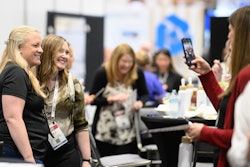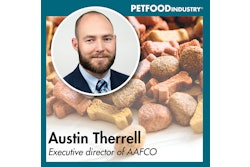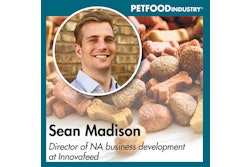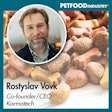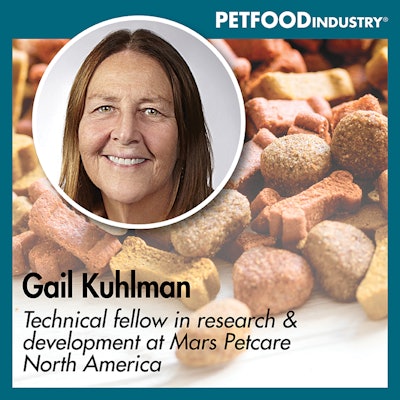
I spoke with Technical Fellow in Research & Development at Mars Petcare North America and industry veteran Gail Kuhlman, live at Petfood Forum 2023 ahead of the conference's Women in Leadership panel, about the path women have blazed through the industry. We talked past, present and future, and you're going to be inspired. Tune in!
The below transcript is from Episode 34 of the Trending: Pet Food podcast. Host Lindsay Beaton sits down with Gail Kuhlman, technical fellow in research & development at Mars Petcare North America and discusses the importance of gender diversity in leadership in the pet food space. You can find the episode at Trending: Pet Food, on SoundCloud or on your favorite podcast platform. This episode was originally recorded at Petfood Forum in May 2023.
Lindsay Beaton – editor, Petfood Industry magazine, and host, Trending: Pet Food podcast: Hello, and welcome to Trending: Pet Food, the industry podcast where we cover all the latest hot topics and trends in pet food. I’m your host and editor of Petfood Industry magazine Lindsay Beaton, and I’m here today, live at Petfood Forum 2023, with Gail Kuhlman, technical fellow in research & development at Mars Petcare North America and, very relevant to our conversation today, one of the committee members bringing us our inaugural Women in Pet Food Leadership Lunch n’ Learn at this year’s show. Hi Gail, and welcome!
Gail Kuhlman, technical fellow in research & development at Mars Petcare North America: Hi Lindsay! Thank you so much for this opportunity. I’m so excited to be here.
Beaton: Gail has over 30 years of experience in the pet food industry. Gail received her B.S. degree in Animal Science from Cornell University, and a Ph.D.in Animal Nutrition and Immunobiology from Iowa State University. She is a Diplomate of the American College of Animal Nutrition and is a certified Professional Animal Scientist. Gail’s entire career has been dedicated to pets and the global Petcare industry, holding R&D positions at Ralston Purina, Royal Canin, The IAMS Company, Procter & Gamble and Mars Petcare. She has held both individual contributor and management roles in the Research & Development function, concentrating on pet nutrition, product development, formulation, recipe simplification, pet feeding, technical services, raw material qualification and supplier relationships.
Gail enjoys being active in the industry and has previously held posts such as the chair of the PFI Nutrition Task Force, chair of the AFIA Pet Food Council, an AAFCO Canine Nutrition Expert, and currently serves on the Food Ingredients Company board of directors for Mars.
Part of Mars Incorporated, Mars Petcare is a diverse and growing business with 85,000+ associates across 50+ countries dedicated to one purpose: A BETTER WORLD FOR PETS. With 85 years of experience, our portfolio of almost 50 brands serves the health and nutrition needs of the world’s pets – including beloved brands like Cesar, IAMS, Pedigree and Sheba.
Gail’s extensive industry experience and drive to continue moving the industry forward is why I brought her on today, ahead of our Women in Pet Food Leadership panel, to answer this question: What is the future of women in the pet food industry?
Because of all your experience, we're going to go back in time a little bit. I'm very interested to pick your brain on when you first entered the pet food industry. What was your impression when it came to where women existed in the space?
Kuhlman: Just to set the stage, a little bit, Lindsay, I got my undergraduate and postgraduate degrees in agriculture. At the time, when I was in school, there were very few women in agriculture. Agriculture was looked upon as a field for men. While there were a few women, the women primarily were interested in becoming veterinarians, and would get a lot of flak from the men. How could a woman possibly be strong enough to lift a large dog or to pull a calf during a breach birth?
It was a lot of ridicule and a lot of harassment. It's funny, because when I think back, during World War II, for example, the men went to war, the women raised all the animals, led all the farms, took care of the families, and really did it all. They seemed to be very successful in it. So it’s odd that people would think that women couldn't be in the agriculture industry.
Then I went into the pet food industry, and I initially joined a group of nutritionists. There were quite a few women, and I was very excited and very engaged, because that had not been my history in the agricultural fields. It was very specific to the nutrition group, because if you looked at the engineers or the packaging managers at that time, or, any of the senior leadership, any of the leadership at all -- it wasn't women. It was all men.
Also surprising to me, because at that time, the demographic data started becoming apparent that women were the major purchases of pet food. You would think people would want more women on their team, but that was not the case. Also at that time, women were giving classes on how to live in a man's world. I remember taking a course called, “How to Talk to Men.” In that course, we learned how to use sports analogies, because that was the best way to talk to men. And me, not being an athlete in high school or college, talking sports analogies was quite a joke.
I also remember one time -- I'll tell you a little story to give you an idea of how the industry was back then. I was working as a nutritionist for a pet food company. We sponsored a lot of sporting dogs -- very important, very influential people. I got a phone call one day from a Southern gentleman who told me that he had a dog, and the dog just had a very large litter, and the dog was a small dog, and couldn't raise the litter all by herself. Would I know how he could help the dog nutritionally? Knowing that I was a woman, I would probably have to ask someone else. But could I come up with any solution for him?
That was a challenge. Of course, I made a weaning porridge and ensured that those dogs did great. I also made sure he realized that I was the person who formulated it. That's my snapshot on how we were.
Beaton: I really hope this answer is positive. How has that impression changed over the years? Were there any points specifically that were historical? Have there been any big leaps, or has it been more incremental?
Kuhlman: I know that we're seeing more and more women in the pet food industry, and we're seeing more senior women leaders as well. For example, at Mars, for the first time ever, our U.S. pet nutrition business has a female president. When you look around the room in our senior leadership meetings, you'll see a lot more women present than you've seen in the past. It's very, very exciting.
I remember my first boss who promoted me into a director role. When I look back, I think, “Wow, what a risk taker. What a pioneer in the industry.” I was only one of two women that sat on the leadership team at that time, so it was still very much a man's world.
What is happening today is there are a lot of opportunities for women. I see that the number of women in STEM careers has really, really increased. That's helpful. There’s also some truth in strength in numbers. The more women that we have in the industry, the more women sponsors we will have for other women, so that helps move women forward.
With COVID, the only one thing that was good that came out of the pandemic, in my eyes, is the flexibility of workspaces. The flexible hours, the virtual meetings, better work-life balance. That’s also helped women to the forefront, to move forward, to take greater risks in larger positions and be away from the home or be more active in the job, because there's other alternatives than just being in the business office.
Finally, the real focus on diversity and inclusion that businesses are doing today. This concerted effort has also helped women move forward to the forefront.
So yes, Lindsay, it is positive impression. More women are in our industry. More women are moving into senior positions. There’s more activity for encouraging and promoting women. As you mentioned, our Women in Petfood Leadership meeting is just another exciting piece to have us promote and continue to educate women and move them forward in their careers.
Beaton: I know you've been doing this for some time, and this has been your message for some time. Who did you need to get in your corner? Who are the best people to have in your corner to make something like this continue to evolve?
Let's say you're maybe you're not even in the pet food industry, and you're listening to this. You're in another industry that's perceived as male dominated, or is male dominated, and you want to make some inroads, maybe you've been in the industry for a while, and you feel like you have some weight to throw around. As somebody who has been there and done that. If there's a you in another industry, or if there's another you in the pet food space, what are some of the things that you can impart to them so that they can help with all of this?
Kuhlman: What is important is knowing your worth. Gaining your confidence. Building your own self credibility and insurance. Knowing who I am and what I stand for, and being able to communicate that and verbalize that has made me stronger and has made me be able to move forward, and has allowed my voice to be heard, both for women and my male counterpoints.
Leveraging my resources has been very valuable to me. I spend a lot of time with mentors, and I embrace any sponsor that wants to take me on. I love helping people work through ways to make me better and stronger, giving me the feedback to help me grow, finding opportunities for further learning. I also think that being a mentor has really helped me grow and helped me move forward and helped me get inside the industry more.
Being mentored, of course, always helps, right? You grow and you learn, and you develop in a situation where you're the mentee, but also being the mentor helps you learn so much about others and shed a light on how you can grow and develop further. Being both a good mentor and a strong mentee has really helped me move forward.
Beaton: Going back to the pet food industry, what are some of the current opportunities for women in the space? And what are the challenges for women in the pet food industry, whether it's real or perceived?
Kuhlman: The opportunities in the industry today for women are bountiful. Women should never stop pursuing their dream. Based on a plethora of data that exists, businesses are seeing that men and women each bring different skills to the table and enhance business performance. Data demonstrates that women have brought forth the ability to build strong relationships across all levels. They are courageous, great risktakers, more resilient and tend to manage ambiguity greater than they were originally given credit for.
Confidence is becoming more equal. I remember when I first took the position I'm in today, and I was just one of two women on a leadership board. I found that I would always begin my statements or my thought process by saying, “Well, this may just be my opinion” or “Well, maybe just let me” -- and it was my boss, my male boss, that caught me on that. He said, “Stop apologizing. You know what you're doing. You wouldn't be in this role if you didn't know what you were doing.” That really helped me grow. That helped me build my confidence and made me even better at what I do today.
I also feel, as a scientist, bias can happen when we only have one voice at the table. As the industry begins to see this, and as we can continue to communicate that, our opportunities grow further. Hidden bias occurs when it's just a male voice or dominated primarily can go away and help us make better decisions.
As far as challenges, there's two things we face today. The first, I'll term “micro exclusions.” What I mean by that, Lindsay, is whenever there's a party at work -- whenever someone's leaving, whenever we need to plan to bring in donuts and coffee -- it always seems like that's a job left up to a woman. I have not yet seen men jump and take the opportunity to go buy the donuts. I think that's a challenge for us. I'm learning ways to get around that. When someone says to me, “Hey, it's Lindsay's birthday tomorrow. Will you pick up a cake?” I turn around and I look at that person and say, “You know what? I think you pick better cakes than me. Why don't you do it?” It's a great way to learn how to deal with that micro exclusion.
The second challenge we have, I believe, is retention. The industry will need to ensure that work-life balance continues to exist and get even stronger. A Mackenzie study recently showed that women today are more burnt out than they were at the beginning of the pandemic. It's important that businesses realize things like paid time off resources for stress management and truly encouraging associates to disconnect when they're not working. These are critical things that will help women be happy and have long, successful careers and be able to stay on board.
Beaton: So much of what you're talking about is systemic. It's been going on for so long that as women, we're not even aware of it until it's being pointed out to us. I think some of it is generational as well. The next generation, Gen Z, who's coming up and entering the workforce -- they're at the start of their careers. They're so much more socially aware. I'm an elder millennial, and I consider myself socially aware -- like we have given it a good go. But Gen Z is another area. They're still entering a system that's been around for a long time. I think each successive generation is making incremental changes, but then you talk about things like micro exclusions. They're so ingrained that nobody gives it a second thought.
Somebody might be listening to this, and they're like, “What does it matter who brings the donuts? Why does that matter?” Let's help them understand why that's not a small thing.
Kulman: It's not a small thing when it's systemic. If I'm bringing the donuts every day, then I'm also not doing other things that are very important in my life. For me, taking a turn is fine, but let's be equal and let's all take turns. That’s kind of the pinch-point for me – when it's an all-or-none situation.
Why should we have both men and women or a diverse group of people sitting at the table? Because all those viewpoints make us even stronger and better together. People really need to know their worth and own it. Own up to it. Accept and embrace ourselves and what we can do and what we can't do. Buying donuts is easy, but it's not something that I probably want to do every day.
Beaton: Let’s say you're a man and you're listening to this right now, and depending on your age, where you are in your career and what generation you're with, you're probably having a couple different reactions to what we're talking about. It might be discomfort. It might be, “you're right.” It might be, “I'm aware of this, but I don't know what to do about it.”
Everybody listening wants to make sure their business succeeds. Like you keep saying, the only way it's going to succeed is with diversity. You need more voices at the table. More women are in the workforce, and more women want these positions.
I'm the coordinator for the student program, and a good chunk of the presentations that I listened to this morning and that I will be moderating tomorrow are from women who are going to be entering the industry as researchers, as scientists, as educators. It's coming no matter what. It’s already here.
So, if you're a man in a position of authority, and you're like, “I hear you. I want to do all of this. What do I need to do to make sure I'm fostering the type of environment where women will want to come work for me? How can I retain these people?”
What are some of the key points people might need to look at within their own organizations to make sure that everything lines up? Because it's easy, especially if you're a legacy brand or you've been around forever, you might be coasting along on the way you've done things for the last 20 years, but you just can't do that anymore. What are some of the key things for people who want to make it right?
Kuhlman: First, you're asking me to think as a man, and I'm not sure that's fair, Lindsay. I think why not have that partnership? Men have had partnerships with men forever. It's obvious that works very well. Maybe they're talking those sports analogies I'm not good with, I don't know. But become a partner. Ask me how you can help me.
I think women have made it very clear about the burnout, about the interest for further education, about the flexibility they need. We're not quiet. We have a voice, and I think that voice has been heard. We did a survey at Mars last year. It wasn't just of Mars people. It was 10,000 women across 88 different countries.
The survey was about how to break down barriers. We found a lot of good information. We realized that 25% of the women shared they need greater work-life balance. How to accomplish that, how to help with flexible working schedules, how to embrace more diverse styles, how to ensure performance reviews are tailored to recognize and advance workers who will take advantage of these flexible schedules. The word is out there. How can we help people who can't find the word, get the word, I think, is what you're really asking.
It's things just like we're doing right now. Lindsay. Communicating, sharing, wanting to partner, wanting to work together and make the world a better place for men, women and all groups.
Beaton: As a long-time industry person, what would be your advice to women entering the space right now, or people who do not identify as men? How can they find mentors? How do they connect with like-minded people? What is the best way to set yourself up for success?
Kuhlman: Three things come to mind. First, as we mentioned earlier, be confident in yourself. Know your worth. Don't apologize. Continue to build your confidence with learning. Be who you are. Be confident, be strong.
The second thing would be leveraging your resources. Find mentors, embrace sponsors. Decide what you need in a mentor. How many mentors do you need? Is it a male? Is it a female? Is it a boss? Is it a colleague? Do you meet once a month? Do you meet twice a year? Do you meet every week? Figure out what it is you need and take advantage of that. Make that happen. Speak up and make that happen.
Finally, take care of yourself. Not just your health, not just your physical health, but your overall well-being. Don't be afraid to ask for what you need. Don't be afraid to promote yourself. Don't be afraid to ask for a mental health day, for that promotion, or can I work that special project, please?
Beaton: Having been involved in this industry for 30 years, what do you think the pet food industry is going to look like 10 years from now in terms of demographics?
Kuhlman: I'm very hopeful, Lindsay. I want to believe we'll be at a much better place regarding diversity. I think companies are truly beginning to embrace diversity, and I believe that pattern will continue.
Female presence at the leadership table is weak, and the change is slow, but it is happening. It is happening. I believe women presence will grow stronger as businesses continue to understand the benefits of a diverse work team. I believe that the business language is beginning to change. Women are no longer referred to as “too emotional” or “too bossy.”
We're partners. We're getting there. Women are born leaders and should be recognized that way. If you think about a stay-at-home mom, these folks need to make decisions every day. They need to demonstrate teamwork. They manage how many projects on top of each other while doing all these other things. These are powerful, super intelligent women.
The importance of having this at your table needs to grow, and it needs to be clear, and it needs to be understood. I'm also hopeful as we continue this movement for diversity and allow, as I call it, having many voices at the table, that we can sit, not just women, but all other minority groups that we tend to discriminate based on race or disability or age or sexual orientation.
We as an industry need to shift and begin to recognize individuals for their talents, their skills and experiences, rather than recognizing them as diversity trophies. I believe we'll get there, Lindsay. We need to continue putting the right policies and procedures and the right educational programs in place and allow people to develop the skills they need in the future.
Beaton: I think that is an excellent note to end on. Thank you very much for speaking with me today, Gail. The pet food industry is certainly diversifying, and as more pet food business owners, researchers, students and entrepreneurs who identify as women, as nonbinary, as POC, as anything or anyone other than the historical makeup of the pet food business take their places, it makes sense to be aware of how the industry is reshaping itself and what that means for its future. Before we go, let’s do a little plug: where can people find more information about you and Mars Petcare?
Kuhlman: I’m on LinkedIn as Gail Kuhlman, so please feel free to reach out to me at any time if you have questions, concerns, or just want to chat. For Mars, of course, mars.com/our-brands/petcare.
Beaton: That’s it for this special episode of Trending: Pet Food live from Petfood Forum 2023. You can find us on petfoodindustry.com, SoundCloud or your favorite podcast platform. You can also follow us on Instagram @trendingpetfoodpodcast. And if you want to chat or have any feedback, I'd love to hear from you. Feel free to drop me an email: [email protected].
Once again, I'm Lindsay Beaton, your host and editor of Petfood Industry magazine, and we'll talk to you next time. Thanks for tuning in!



